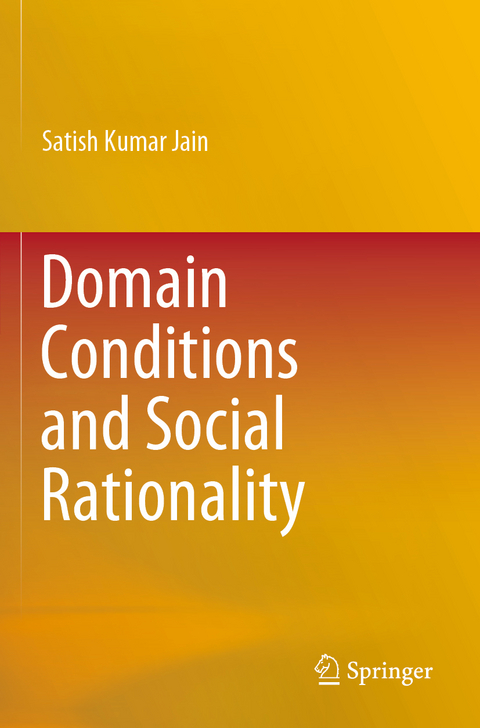
Domain Conditions and Social Rationality
Springer Verlag, Singapore
978-981-13-9674-8 (ISBN)
This book formulates conditions for transitivity and quasi-transitivity for several classes of social decision rules, including majority rules, non-minority rules, Pareto-inclusive non-minority rules, and social decision rules that are simple games. It also analyzes in detail the conditions for transitivity and quasi-transitivity under the method of the majority decision, and derives the maximally sufficient conditions for transitivity under the class of neutral and monotonic binary social decision rules and one of its subclasses. The book also presents characterizations of some of the classes of rules for which domain conditions have been derived.
The material covered is relevant to anyone interested in studying the structure of voting rules, particularly those interested in social choice theory. Providing the necessary social choice theoretic concepts, definitions, propositions and theorems, the book is essentially self-contained. The treatment throughout is rigorous, and unlike most of the literature on domain conditions, care is taken regarding the number of individuals in the 'necessity' proofs. As such it is an invaluable resource for students of economics and political science, with takeaways for everyone – from first-year postgraduates to more advanced doctoral students and scholars.
Satish K. Jain is an economist who holds a Master’s in Economics from Delhi School of Economics and a Doctorate in Economics from the University of Rochester. He was on the faculty of the Centre for Economic Studies and Planning at Jawaharlal Nehru University for three and a half decades. He was Reserve Bank of India Chair Professor from 2011 to 2013, and was an Indian Council of Social Science Research (ICSSR) National Fellow from 2016 to 2018. He has taught at Shri Ram College of Commerce, Delhi; the Indian Statistical Institute, Delhi; and the Indian Institute of Information Technology, Hyderabad. He has authored Economic Analysis of Liability Rules (Springer, 2015); edited Law and Economics (Oxford University Press, 2010); and co-edited Economic Growth, Efficiency, and Inequality (with Anjan Mukherji, Routledge, 2015). His teaching and research interests include social choice theory, and law and economics.
Chapter 1. Introduction.- Chapter 2. The Preliminaries.- Chapter 3. The Method of Majority Decision.- Chapter 4. The Strict Majority Rule.- Chapter 5. The Class of Semi-Strict Majority Rules.- Chapter 6. Special Majority Rules.- Chapter 7. The Class of Strict Majority Rules.- Chapter 8. The Class of Pareto-Inclusive Strict Majority Rules.- Chapter 9. Social Decision Rules Which Are Simple Games.- Chapter 10. Neutral and Monotonic Binary Social Decision Rules.- Chapter 11. Quasi-Transitive Individual Preferences.- Chapter 12. Summary and Concluding Remarks.
| Erscheinungsdatum | 20.11.2020 |
|---|---|
| Zusatzinfo | XIX, 193 p. |
| Verlagsort | Singapore |
| Sprache | englisch |
| Maße | 155 x 235 mm |
| Themenwelt | Mathematik / Informatik ► Mathematik ► Angewandte Mathematik |
| Mathematik / Informatik ► Mathematik ► Wahrscheinlichkeit / Kombinatorik | |
| Sozialwissenschaften ► Soziologie | |
| Wirtschaft ► Allgemeines / Lexika | |
| Wirtschaft ► Volkswirtschaftslehre | |
| Schlagworte | Majority Rules • Social Choice Theory • Social Decision Rules • Social Preference • Welfare and Choice |
| ISBN-10 | 981-13-9674-4 / 9811396744 |
| ISBN-13 | 978-981-13-9674-8 / 9789811396748 |
| Zustand | Neuware |
| Informationen gemäß Produktsicherheitsverordnung (GPSR) | |
| Haben Sie eine Frage zum Produkt? |
aus dem Bereich


